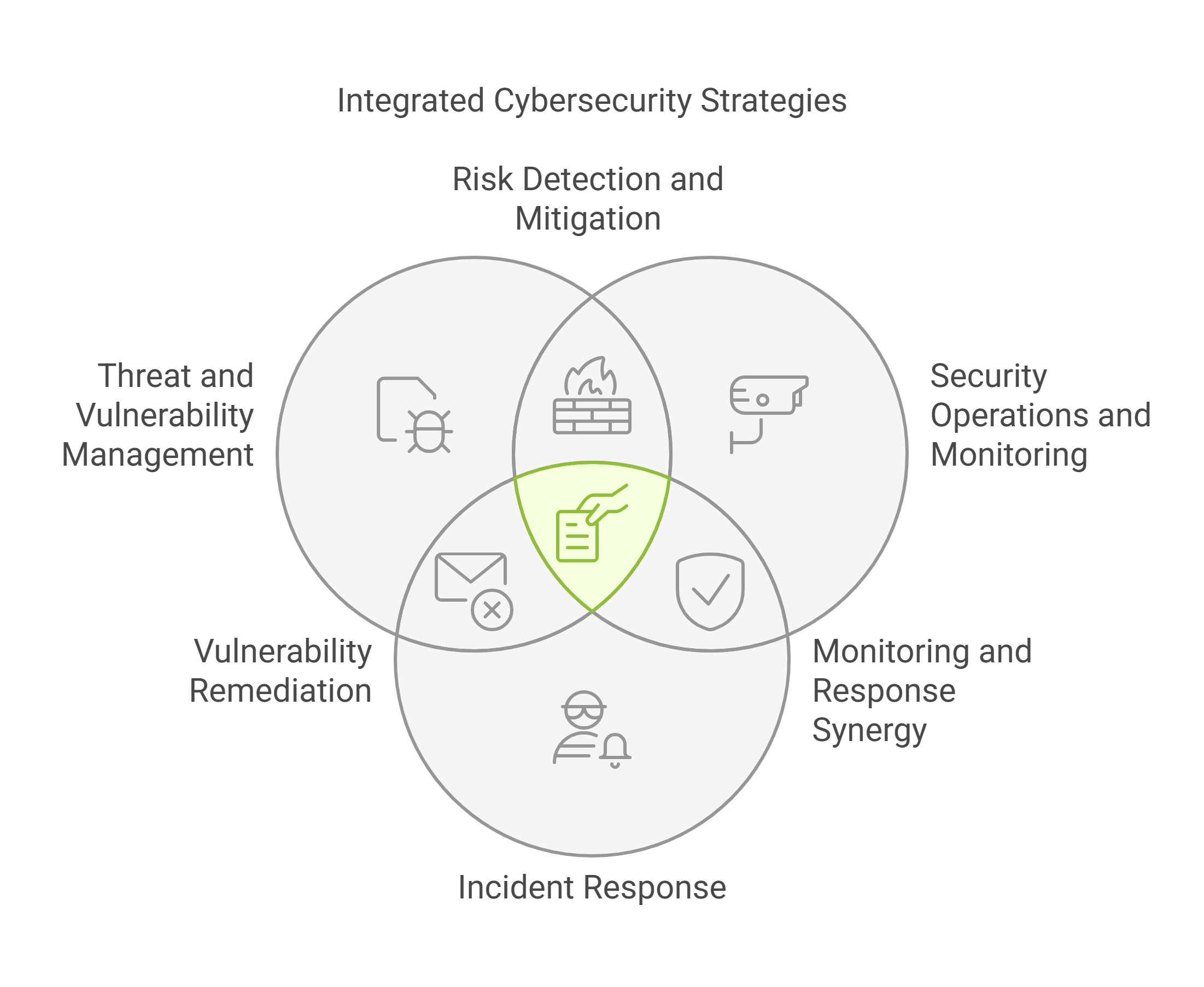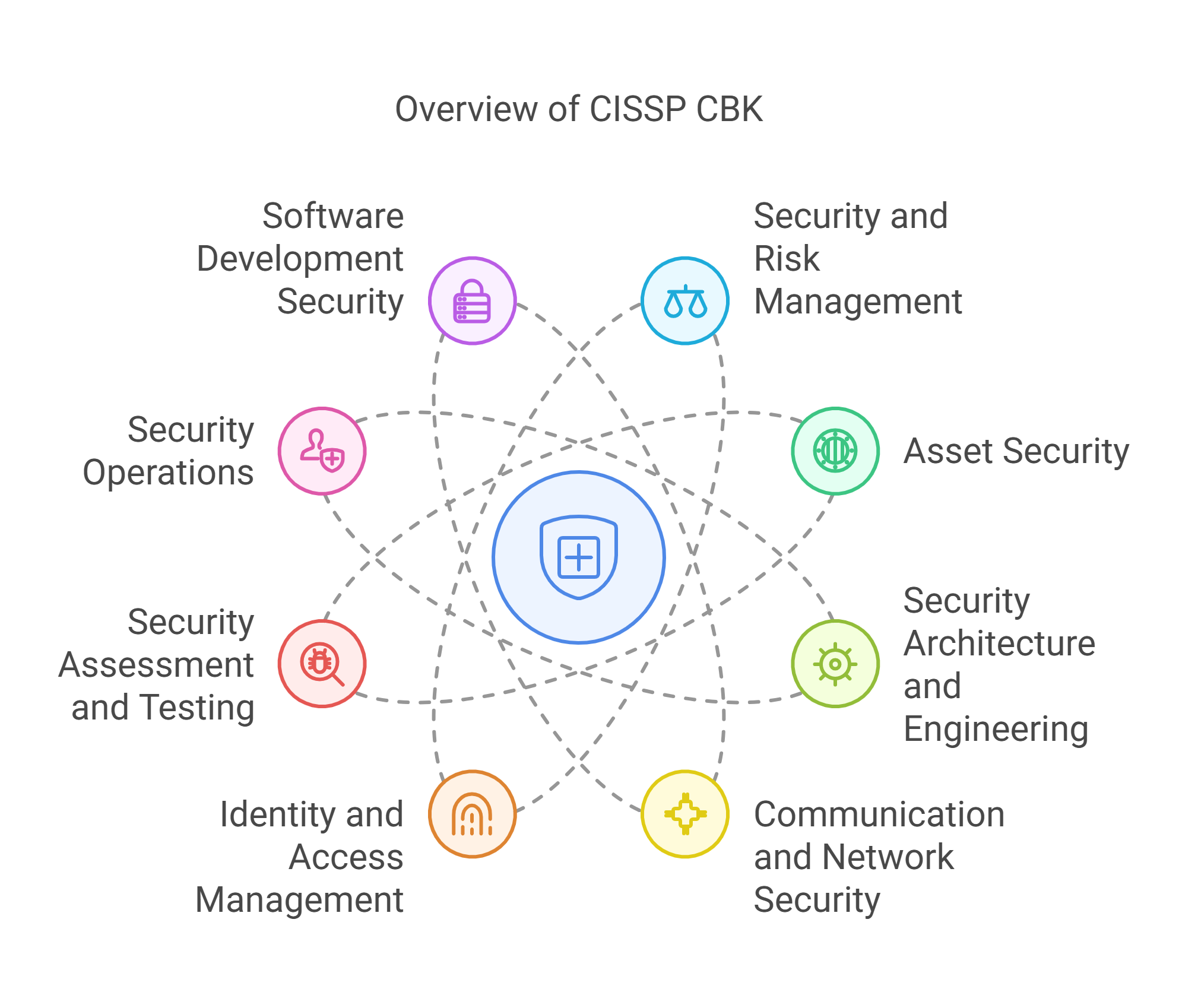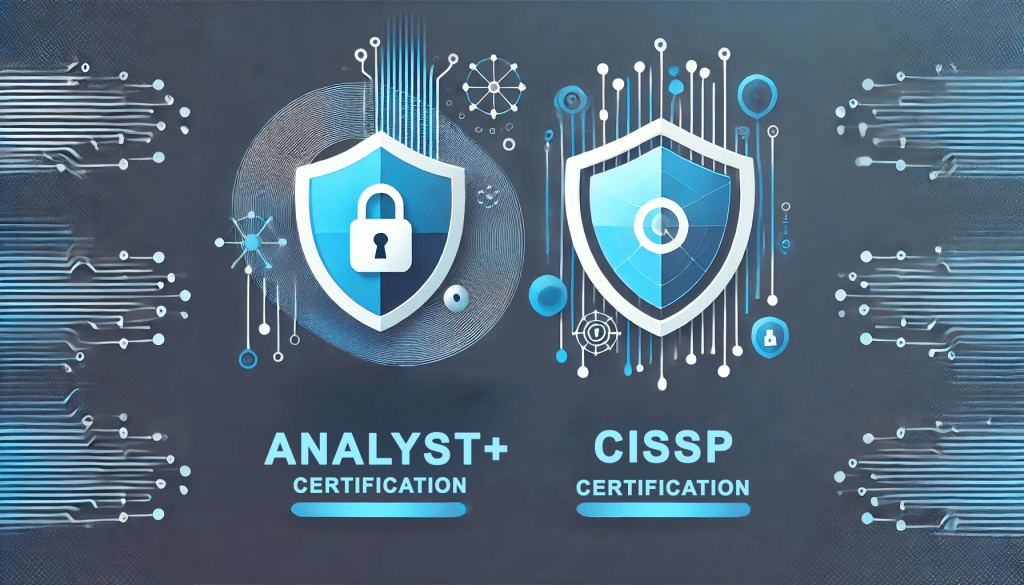Two names often stand out in the crowd: CompTIA Analyst+ (CS0-003) also known as CYSA+ and CISSP (Certified Information Systems Security Professional). These certifications cater to distinct skill sets and career goals, yet they’re frequently compared.
Whether you’re starting your cybersecurity journey or aiming for senior-level roles, understanding the differences between CySA+ and CISSP is crucial.
This blog breaks it all down for you, exploring their focus areas, career potential, and what they bring to the table. Let’s dive in and see which one aligns with your goals.
Comparison
| Aspect | Analyst+ CS0-003 | CISSP |
| Overview | An entry-level certification focusing on foundational cybersecurity skills and knowledge. | An advanced-level certification for professionals with extensive experience in cybersecurity. |
| Target Audience | Individuals starting their cybersecurity career. | Experienced security professionals, managers, and executives. |
| Focus Areas | Security fundamentals, incident response, threat management, and network security. | Comprehensive security management, risk management, governance, and secure architecture. |
| Prerequisites | At least 2 years of hands-on experience in IT with some security knowledge recommended. | 5 years of work experience in at least two of the eight CISSP domains. |
| Domains Covered | Risk ManagementIncident ResponseThreat ManagementNetwork Security | Security and Risk ManagementAsset SecuritySecurity Architecture and EngineeringIdentity and Access Management (IAM)Security OperationsSoftware Development Security |
| Exam Length | 85 questions; 2 hours. | Up to 175 questions; 4 hours. |
| Exam Format | Multiple-choice and performance-based questions. | Multiple-choice and advanced innovative questions. |
| Exam Fee | $349 (USD). | $749 (USD). |
| Certification Maintenance | Valid for 3 years; requires continuing education (CEUs). | Valid for 3 years; requires 120 CPEs (Continuing Professional Education credits). |
| Difficulty Level | Moderate; suitable for individuals starting their cybersecurity career. | High; requires in-depth knowledge and professional experience in cybersecurity. |
| Industry Recognition | Recognized as a valuable certification for entry-level cybersecurity roles. | Highly respected as one of the top certifications for experienced cybersecurity professionals. |
| Job Roles | Cybersecurity AnalystSecurity ConsultantIT Support Specialist | Security ArchitectChief Information Security Officer (CISO)Security Manager |
| Salary Impact | Entry to mid-level salary range ($50,000–$85,000 annually). | High salary potential ($100,000–$150,000+ annually). |
| Ideal For | Individuals looking to enter the cybersecurity field and build foundational knowledge. | Experienced professionals aiming to advance their career in leadership or specialized security roles. |
| Vendor | CompTIA | (ISC)² |
What Sets Analyst+ CS0-003 and CISSP Apart from Each Other?
Certifications like CySA+ and CISSP are both big names in the cybersecurity certification front, but their goals and what they prepare you for couldn’t be more different. Before deciding which is right for you, it’s important to get a clear picture of their focus and purpose.
Analyst+ (CS0-003): Focus on Detection, Response, and Analysis
The CySA+ certification is all about practical skills in doing security analytics identifying threats, analyzing vulnerabilities, and responding to incidents. If you’re someone who thrives on diving deep into logs, running scans, and figuring out what’s behind suspicious activity, CySA+ might be your thing.
CySA+ is hands-on. It’s designed for roles like Security Analysts or SOC (Security Operations Center) professionals. These are the folks who are in the trenches every day, working to protect networks and systems. The exam itself tests real-world knowledge think analyzing packet captures, identifying malware behaviors, or interpreting risk reports.
It’s a mid-level cert, meaning it’s perfect if you already have a foundational knowledge of cybersecurity (like Security+ or equivalent experience) but want to specialize in the nitty-gritty of cyber defense. CySA+ aligns closely with day-to-day operational tasks, making it great for those who like practical, action-driven roles.
CISSP: A Broader Look at Security Leadership and Architecture
Now, CISSP is a whole different beast. It’s not about diving into system logs or running vulnerability scans; instead, it’s for those aiming to design, implement, and manage an organization’s overall security structure. Think of CISSP as the certification for managers, architects, and leaders in cybersecurity.
The CISSP exam is rigorous. It covers eight domains, including risk management, information security analyst, engineering, and identity management. This isn’t something you tackle lightly, it requires deep knowledge across multiple areas, not just technical skills but also strategic thinking and governance.
One of the standout features of CISSP is its focus on big-picture security. If you’re aspiring to roles like Chief Information Security Officer (CISO) or Security Manager, CISSP sets you up with the knowledge and credibility to get there. It’s globally recognized and often a must-have for higher-level positions.
If you’re targeting leadership and architecture roles, this CISSP exam guide walks through domains, format, and a realistic study roadmap.
Comparing Their Core Purposes
In simple terms, CySA+ is for the doers people who want to analyze, respond, and mitigate threats on the ground. CISSP, on the other hand, is for the planners and strategists who shape and oversee an organization’s entire cybersecurity framework. Both are valuable, but the choice depends on your career aspirations.
Where CySA+ thrives in practical, hands-on security, CISSP excels in leadership and comprehensive security management. Each certification caters to a different level and focus, so your decision should be based on where you see yourself growing in the cybersecurity field.
For domain-by-domain objectives, PBQ expectations, and scoring insights, see the Analyst+ CS0-003 exam guide.
Choosing the Right Path: Where Do These Certifications Lead?
Certifications aren’t just badges they open doors. Whether you’re eyeing CySA+ or CISSP, your choice can shape the trajectory of your cybersecurity career. Both certifications serve different purposes, appeal to distinct roles, and cater to varying experience levels. To make the best choice, it helps to understand what each path offers and how they align with your goals.
Analyst+ vs. CISSP Career Opportunities: What’s the Difference?
CySA+ is aimed at professionals who thrive in technical, but hands on experience first-on roles. Think of positions like:
- Security Analyst: Monitoring networks, analyzing threats, and implementing defenses.
- Threat Intelligence Analyst: Gathering and interpreting data about potential cyber threats.
- Incident Responder: Handling security breaches and minimizing damage.
These roles are crucial for organizations needing a strong front line against cyberattacks. CySA+ equips you with the skills required to identify vulnerabilities and act quickly.
On the other hand, CISSP is a ticket to senior-level positions, often with managerial responsibilities. Typical roles include:
- Security Architect: Designing and implementing security frameworks.
- Security Manager: Overseeing teams and ensuring organizational compliance.
- Chief Information Security Officer (CISO): Leading company-wide security strategies.
CISSP prepares you to think strategically, manage risks, and oversee large-scale security operations.
Industries and Roles: From Analysts to CISOs
Both certifications are in demand across industries, but the roles they serve can vary:
- CySA+ Candidates: You’ll find opportunities in sectors like finance, healthcare, and government. Organizations in these fields are constantly dealing with threat detection and need skilled analysts to keep their systems safe. Tech companies and SOCs are also big employers for CySA+ holders.
- CISSP Professionals: CISSP-certified individuals often end up in industries with high regulatory requirements, such as banking, defense, or multinational corporations. These environments need strategic leaders to handle compliance, risk, and large-scale security management.
The career ladder is different for each certification. While CySA+ positions tend to focus on entry to mid-level roles, CISSP is more aligned with senior positions and broader responsibilities.
Are Analyst+ and CISSP Mutually Exclusive in Career Growth?
Not at all. In fact, many professionals see CySA+ and CISSP as complementary rather than competing certifications. CySA+ gives you the technical foundation to thrive in operational roles, while CISSP positions you for leadership and strategic growth.
Here’s an example: You might start as a Security Analyst (leveraging CySA+ skills), then progress into a Security Manager role as you gain experience and earn your CISSP. The two certifications can work together to build a well-rounded career as cybersecurity analyst.
The key is knowing where you are now and where you want to go. CySA+ is ideal if you’re building your expertise in cybersecurity operations. CISSP, meanwhile, suits those ready to lead teams, take security consultant manage risks, and shape security policies at a high level.
How Do the Exam Formats Compare?
The structure of a certification exam often reflects the skills it seeks to evaluate. CySA+ and CISSP have distinct exam formats tailored to their unique exam objectives each. Let’s break down how they test candidates and what’s required to excel.
CySA+ (CS0-003): Domains, Practical Skills, and the Hands-On Approach
The CySA+ exam is practical and task-oriented. It’s designed to assess your ability to detect, analyze, and respond to security threats in real-world environments. Here’s what you can expect:
- Exam Details: The CySA+ exam (CS0-003) consists of up to 85 questions. These include multiple-choice, drag-and-drop scenarios, and performance-based items. The performance-based questions simulate real-world tasks, like analyzing log files or interpreting vulnerability scans.
- Domains Covered: The exam focuses on these core areas:
- Threat and Vulnerability Management
- Software and Systems Security
- Security Operations and Monitoring
- Incident Response
- Compliance and Assessment
- Time: You have 165 minutes to complete the exam.

CySA+ emphasizes hands-on skills, making it an excellent fit for roles that require practical cybersecurity knowledge. It’s not just about theory; you’ll need to demonstrate your ability to work with tools, analyze data, and make decisions under pressure.
CISSP: Depth, Breadth, and the Weighted Exam Format
CISSP takes a broader, more theoretical approach. It evaluates a candidate’s understanding of security principles across various domains and their ability to apply them at a strategic level.
- Exam Details: The CISSP exam uses a Computerized Adaptive Testing (CAT) format for English-language test-takers. This means the test adjusts its difficulty based on your answers. You’ll face 100–150 questions, and you have three hours to complete the exam.
- Domains Covered: The CISSP Common Body of Knowledge (CBK) covers eight domains:
- Security and Risk Management
- Asset Security
- Security Architecture and Engineering
- Communication and Network Security
- Identity and Access Management
- Security Assessment and Testing
- Security Operations
- Software Development Security
- Question Types: The test includes multiple-choice and advanced innovative items that require deeper analysis.

CISSP challenges candidates to think holistically. Instead of focusing on hands-on tasks, it tests strategic problem-solving and decision-making skills across a wide range of security topics.
For the complete guides about the Analyst+ and CISSP exam, you can explore the following links:
– Analyst+ Exam Guide
– CISSP Exam Guide
The Role of Experience in Tackling Each Certification
CySA+
- Ideal for candidates with 1–2 years of experience in roles like SOC analyst, threat hunter, or incident responder. While foundational knowledge from certifications like Security+ can help, direct exposure to cybersecurity tools and systems is key.
- The exam assumes familiarity with basic concepts like log analysis, vulnerability management, and SIEM tools. If you’ve worked hands-on in these areas, you’ll have a significant advantage.
CISSP
- Requires at least five years of experience in two or more domains of the CISSP Common Body of Knowledge (CBK). This experience prerequisite ensures that candidates are well-versed in both technical and managerial aspects of cybersecurity.
- Professionals with a background in risk management, security architecture, or compliance will find the CISSP content more aligned with their expertise. Without substantial experience, the breadth of topics can feel overwhelming.
Time Investment: How Long Does It Take to Prepare?
CySA+
- Preparation Time: 3–6 months for candidates with foundational cybersecurity knowledge. Those without prior experience may need additional time to build hands-on skills.
- Focus Areas: Candidates should dedicate time to mastering log analysis, threat intelligence, and incident response tools. Hands-on practice is crucial, as the exam prioritizes practical skills.
CISSP
- Preparation Time: 4–8 months or longer, depending on your familiarity with the eight domains. Many candidates balance preparation with full-time jobs, which can extend the timeline.
- Focus Areas: Given its comprehensive scope, candidates must allocate time for both theoretical study and real-world applications. Practice exams and domain-specific study guides are essential to cover the vast content effectively.
Need a week-by-week routine with PBQ tactics and recall drills? Use these CS0-003 study tips to lock in a passing plan.
Salary Expectations: CySA+ vs CISSP
The earning potential tied to certifications like CySA+ and CISSP is one of the biggest factors professionals consider when choosing their path. While both certifications can enhance your career, the salaries they command vary significantly based on job roles, experience, and industry demand.
CISSP vs CySA+ Salary Benchmarks Across Roles
CySA+ Salary Benchmarks
CySA+ is a mid-level certification aimed at technical, hands-on roles. Professionals with CySA+ certification typically earn:
- Security Analyst: $75,000–$100,000 per year
- Threat Intelligence Analyst: $85,000–$110,000 per year
- Incident Responder: $80,000–$105,000 per year
Salaries for CySA+ holders are influenced by factors like location, employer size, and the candidate’s level of experience. In cities with high cybersecurity demand like San Francisco, Washington D.C., or Austin salaries can reach the upper end of the spectrum.
CISSP Salary Benchmarks
CISSP-certified professionals often hold senior-level or management roles, which command higher salaries. Common roles and their average pay include:
- Security Manager: $120,000–$150,000 per year
- Security Architect: $140,000–$180,000 per year
- Chief Information Security Officer (CISO): $180,000–$250,000 per year
The global recognition of CISSP as a gold standard in cybersecurity contributes to its higher salary range. Employers view it as proof of both technical expertise and leadership capability, making CISSP holders highly sought after.
For salaries, growth paths, and hiring demand by industry, explore job roles and trends for CS0-003 professionals.
Why CISSP Often Commands Higher Paychecks
- Leadership and Strategic Skills: CISSP-certified professionals are trained to think beyond technical solutions. They understand risk management, compliance, and governance, which are crucial for high-level decision-making.
- Experience Requirement: The CISSP certification mandates a minimum of five years of work experience in cybersecurity, ensuring that certified individuals have practical, hands-on knowledge and a proven track record.
- Global Recognition: CISSP is often required for senior cybersecurity positions worldwide, making it a key differentiator for higher-paying roles.
- Broader Scope: While CySA+ focuses on operational tasks, CISSP covers broader domains, including policy creation, business continuity, and security architecture, aligning it with leadership roles.
The ROI of CySA+: Is It Worth the Investment for systems security certified practitioner?
CySA+ provides an excellent return on investment for professionals aiming to build a career in cybersecurity operations. Here’s why:
Affordable Entry Point: The CySA+ exam costs significantly less than CISSP, making it an attractive option for early-career professionals or those with limited budgets.
In-Demand Skills: With the rise in cyber threats, roles like SOC analysts and incident responders are more critical than ever. CySA+ prepares you for these roles with skills that are directly applicable to the job; such as certified information systems auditor.
Stepping Stone: CySA+ acts as a bridge between foundational certifications like Security+ and advanced credentials like CISSP. This makes it a great option for professionals looking to steadily climb the career ladder.
Competitive Salaries: While not as high-paying as CISSP roles, CySA+-related jobs still offer solid compensation, especially for a mid-level certification.
Skills Gained: Are They Overlapping or Unique?
Both CySA+ and CISSP are valuable certifications, but they differ significantly in the skills they emphasize. While some areas may overlap, each certification caters to a distinct set of competencies. Understanding these differences and how they can complement each other can help you decide which one aligns better with your goals.
CySA+: Threat Analysis, Vulnerability Management, and IR Basics
CySA+ focuses on training courses equipping professionals with the technical and operational skills needed to identify and respond to cybersecurity threats. Key areas of expertise include:
- Threat Analysis: Learn to detect, analyze, and mitigate threats using tools like SIEM platforms, intrusion detection systems, and packet analyzers.
- Vulnerability Management: Gain expertise in identifying, assessing, and prioritizing vulnerabilities in networks and systems.
- Incident Response (IR) Basics: Understand how to prepare for, respond to, and recover from security incidents, ensuring minimal impact on business operations.
- Operational Security: Develop hands-on skills in monitoring systems, interpreting log files, and using automation tools to streamline defense mechanisms.
CySA+ is ideal for roles requiring practical, day-to-day involvement in maintaining and defending an organization’s cybersecurity posture.
CISSP: Risk Management, Asset Security, and Governance
CISSP focuses on strategic and managerial aspects of cybersecurity. The skills gained from CISSP certification are broader, designed for professionals looking to lead teams and shape security policies. Key skills include:
Risk Management: Develop a strong foundation in identifying, analyzing, and mitigating risks to protect organizational assets.
Asset Security: Understand how to classify, handle, and secure data and systems to align with business and regulatory requirements.
Governance and Compliance: Learn to create and enforce security policies, ensuring alignment with legal, regulatory, and organizational standards.
Security Architecture: Gain the ability to design and implement comprehensive security frameworks for enterprises.
These skills prepare professionals for leadership roles where strategic thinking and big-picture planning are key.
Complementary or Competitive? Bridging the Skills Gap
The skills gained from CySA+ and CISSP are more complementary than competitive. While CySA+ focuses on the “how” of cybersecurity, such as identifying and mitigating threats, CISSP addresses the “why,” emphasizing policies, strategies, and overarching goals.
Here’s how the two certifications can complement each other:
- CySA+ First, Then CISSP: Many professionals start with CySA+ to build their technical skills before pursuing CISSP to move into managerial roles. This progression creates a well-rounded skill set, balancing hands-on expertise with strategic knowledge.
- Specialization vs. Leadership: CySA+ is perfect for those who want to specialize in technical, operational roles, while CISSP suits those aiming for leadership positions in cybersecurity governance and architecture.
- Bridging the Gap: Together, CySA+ and CISSP cover a wide spectrum of cybersecurity, from technical problem-solving to strategic decision-making. Holding both certifications makes you versatile and highly valuable to employers.
Still deciding between entry-level breadth and analyst depth? This Analyst+ CS0-003 vs Security+ comparison clarifies which suits your current stage and goals.
Final Thoughts
CySA+ and CISSP target different aspects of cybersecurity, but they don’t exist in isolation. Their overlapping areas, like risk identification, threat management and security monitoring, create a foundation for professionals who want to be both technically adept and strategically sound.
The choice isn’t about which certification is better. It’s about where you are in your career and where you want to go. Starting with CySA+ and advancing to CISSP with Cert Empire exam dumps can provide the perfect balance for a thriving career in cybersecurity.
Frequently Asked Questions
Can CySA+ and CISSP Coexist on a Resume?
Yes, CySA+ and CISSP complement each other well, showcasing both hands-on technical skills and strategic leadership expertise.
Which Certification Is Better for a Penetration Tester?
CySA+ is better suited for penetration testers, as it focuses on vulnerability management, threat analysis, and operational security skills.
Does CISSP Require More Experience Than CySA+?
Absolutely. CISSP requires at least five years of professional experience in two or more domains, whereas CySA+ is a mid-level cert with no strict experience prerequisites.
Are There Regional Differences in Demand for CySA+ vs CISSP?
Yes, CISSP is globally recognized and in demand for senior roles, while CySA+ sees higher demand in regions prioritizing technical cybersecurity operations.
How Does CySA+ Compare to Other Intermediate Certifications?
CySA+ stands out by emphasizing hands-on, real-world skills, making it more practical compared to theory-heavy intermediate certifications like CEH.


























